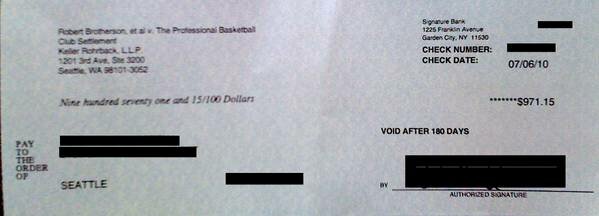
The legal wrangling over the relocation of the Seattle Sonics to Oklahoma City is finally coming to an end.
This week, 2007-08 Sonic season ticketholders--those enrolled in a marketing program called the Emerald Club--started to receive settlement checks as a result of their participation in a successful class action lawsuit against the Professional Basketball Club LLC, the former owners of the Sonics and the current owners of the OKC Thunder.
To date, and likely forever, these checks are the only direct payment to former fans for the loss of a beloved sports franchise that had been in Seattle for 40 years. (Disclaimer: I was a former Sonics season ticketholder, a member of the Emerald Club, and a member of the class in the lawsuit. My wife and I received our check yesterday.)
When former Seattle Sonics owner Clay Bennett announced that he intended to move the team to his home state of Oklahoma, he and his co-owners were challenged with lawsuits. The City of Seattle sued to enforce a lease that would have held the team here until this year. Howard Schultz claimed that the new owners he'd sold to had lied about their desire to keep the team in Seattle.
The City's case, which seemed like a slam dunk, fell apart at trial when former Mayor Greg Nickels was dismantled on the witness stand. (Sherman Alexie's testimonial that the NBA players were "Greek gods" was of limited legal utility.) The City’s case turned what should have been a perfunctory contract enforcement proceeding into a circus and the city, probably wisely, folded the tent and settled without ever learning the court's decision. Schultz quietly canceled his lawsuit shortly afterward.
That left only a strange little case that resulted in this week's delivery of checks to former ticketholders. Robert Brotherson, Patrick Sheehy, and Carolyn Bechtel, the three Sonics ticketholders named in the suit, had, as it turned out, a legitimate case.
In early 2007, the Sonics sent out a renewal package to all season ticketholders. In the brochure, which featured a letter signed by Clay Bennett, the Sonics made an offer to all ticketholders that if they bought tickets for the 2007-08 season, they could buy tickets for the 2008-09 and 2009-10 season at the same price. They called the program the Emerald Club.
The three plaintiffs took the offer at face value and bought the tickets, believing that the offer meant the team was staying for the final two years of the lease. One year later, while the lease fight was heading for court, the Sonics emailed all Emerald Club members and said that, with the lease up in the air, they would not send out renewal packages, but would notify them when the case was settled. The Sonics never called back.
The plaintiffs claimed the failure to offer them the right to buy season tickets at the 2007-08 price, even if the team was in Oklahoma, was a breach of contract. And attorney Mark Griffin, from Keller Rohrback, agreed.
Griffin proceeded on the case despite the fact that, historically, season ticketholders lawsuits are generally unsuccessful: "I was a Sonics fan."
"This case was different," said Griffin. "The Sonics had given Sonics ticketholders in the Emerald Club a specific offer that they could buy tickets for two additional seasons. They gave the ticketholders specific rights. That was the key to the case, and, obviously, a successful key."
Reached by phone today, Griffin is humble about what is a very rare win. Not only is he the only attorney in Seattle to bring a successful suit against an ownership team that moved a franchise, he is the architect of a winning ticketholder suit, which, one of the court documents in the case points out, is almost unheard of.
"When we first started on the lawsuit, the Professional Basketball Club owners basically laughed at us," Griffin told us last year. Griffin held firm.
The case landed in the court of the Honorable Richard A. Jones in the United States District Court. Jones left intact the plaintiffs' claim that the Sonics entered into a contract with ticketholders and then broke that contract. He ruled that all season ticketholders in the Emerald Club were a class for the purposes of the suit. He further ruled that the plaintiffs had suffered damages and decided that a jury should decide the extent of the damages.
Clay Bennett and his co-owners, unwilling to face a Seattle jury, decided to settle.
"I feel gratified that we were able to get some money for the class," said Griffin. "The members of the class were true fans." But is the settlement enough to take away the sting of losing the Sonics? "No," said Griffin. "The plaintiffs would have preferred that the team stay. Unfortunately, we weren't able to do that."
The Sonics are gone two years now. The money extracted from the Thunder owners is negligible; no pain was extracted, only a little annoyance. The Thunder has plenty of cash: the team just gave star forward Kevin Durant a huge contract extension.
What's strange is how little the Sonics seem to be missed outside a precious few fans. Currently, there is no public effort to bring back an NBA team (private discussions are possibly in the works), and no public support for a new arena suitable for professional basketball or hockey.
Perhaps it's better to not have an NBA team. The NBA tends to breed a special kind of heartbreak--just ask Cleveland. We have professional football, baseball, and soccer. Then again, I think many of us miss watching those Greek gods out on the hardwood court.
 Subscribe to our Front Page Stories
Subscribe to our Front Page Stories
![]() Subscribe to all SunBreak Stories
Subscribe to all SunBreak Stories

Most Recent Comments